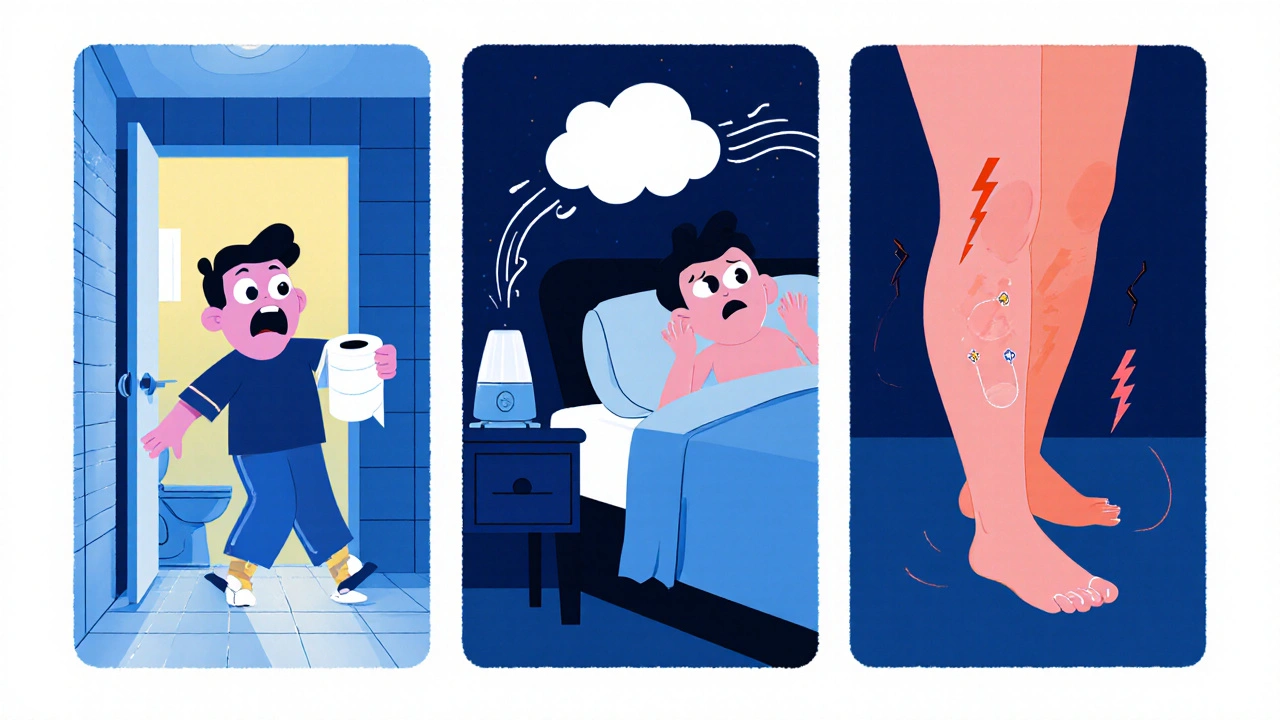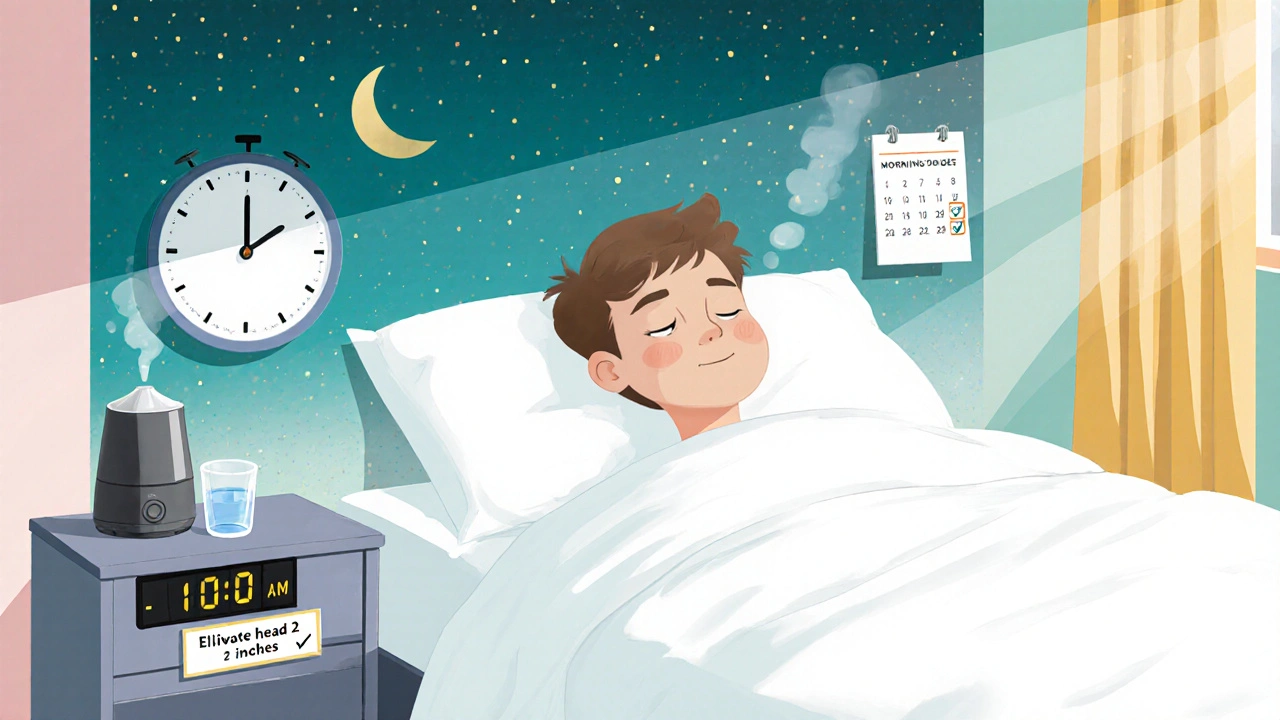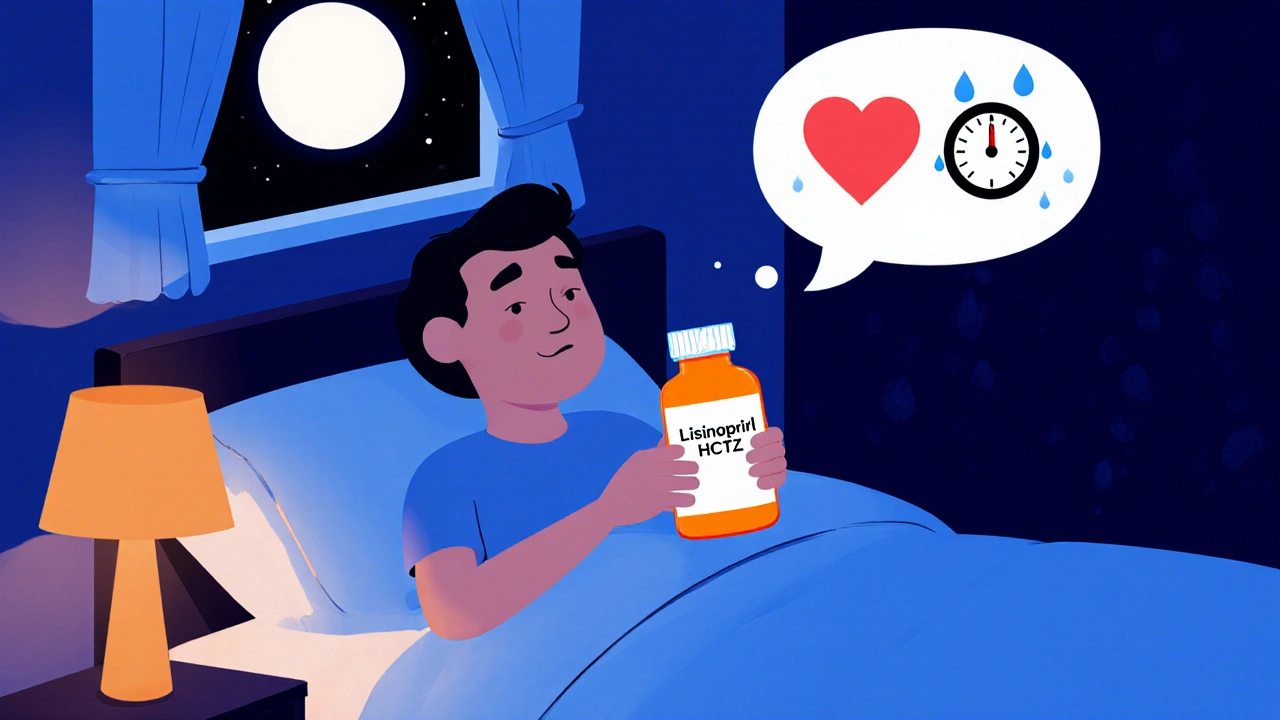Nocturia Estimator for Lisinopril-HCTZ Users
Calculate Your Nighttime Bathroom Trips
Estimate how many times you'll wake up at night based on your medication schedule and fluid intake habits. The tool uses data from medical studies on Lisinopril-HCTZ side effects.
Estimated Nighttime Bathroom Trips
Your Personal Recommendations
Ever wondered why you toss and turn after starting a new blood‑pressure pill? You’re not alone. Many people on Lisinopril‑HCTZ a combination of the ACE inhibitor lisinopril and the diuretic hydrochlorothiazide used to treat hypertension notice changes in their sleep patterns. This guide breaks down what’s happening, why it matters, and how you can get back to restful nights.
What Is Lisinopril‑HCTZ?
The drug is a two‑in‑one tablet. Lisinopril an angiotensin‑converting‑enzyme (ACE) inhibitor that relaxes blood vessels lowers the pressure by stopping a hormone from tightening the arteries. Hydrochlorothiazide a thiazide diuretic that helps the kidneys remove excess sodium and water reduces fluid volume, giving the heart a lighter load. Together they’re a popular first‑line treatment for high blood pressure, especially when a single drug isn’t enough.
How Blood‑Pressure Meds Can Mess With Your Sleep
Blood‑pressure medicines aren’t bedtime villains by default, but a few mechanisms can tip the scales toward insomnia or fragmented sleep.
- Night‑time bathroom trips - Diuretics increase urine output, often peaking a few hours after a dose. If you take the pill in the morning, you might still find yourself up at night.
- Cough or throat irritation - ACE inhibitors sometimes cause a dry cough that worsens when you lie down, making it hard to drift off.
- Blood‑pressure swings - Over‑lowering can cause a sudden drop in blood pressure when you stand, leading to dizziness or a racing heart that interrupts sleep.
- Restless‑leg sensations - Some patients report a tingling or crawling feeling in the legs, a known side effect of certain diuretics.
These effects don’t happen to everyone, but they’re enough to spark a question: "Is my medication sabotaging my sleep?"
Common Sleep‑Related Side Effects of Lisinopril‑HCTZ
Below is a quick snapshot of the most reported sleep issues linked to the combo drug.
| Side Effect | Typical Onset | Frequency |
|---|---|---|
| Insomnia | Within days | 10‑15% of users |
| Nocturia (night‑time urination) | 1‑3 hours post‑dose | 30‑40% of users |
| Dry cough | Weeks | 5‑10% of users |
| Restless‑leg sensations | Variable | ~5% of users |
Notice the heavy hit on nocturia - that’s the diuretic side of the equation. The cough and insomnia are more tied to the ACE‑inhibitor side.
Why Nocturia Happens and How to Tame It
If you’re up three times a night to hit the bathroom, the culprit is likely Hydrochlorothiazide. It peaks in the bloodstream roughly 2‑4 hours after you swallow the tablet, prompting the kidneys to dump fluid.
Here are a few practical tricks:
- Take the dose early in the morning, preferably before 10 a.m.
- Limit salty foods and caffeine after noon - they boost fluid retention and urine output.
- Keep a glass of water by the bedside for a quick sip, then head straight back to sleep.
- If nocturia persists, ask your doctor about a lower dose or switching to a once‑daily extended‑release formulation.
These steps often cut nighttime trips by half, giving you a longer stretch of uninterrupted sleep.
The Dry Cough Conundrum
The cough linked to Lisinopril is a classic ACE‑inhibitor side effect. It’s thought to arise from increased bradykinin levels in the throat, which can feel tickly especially when you lie flat.
Tips to soften the cough:
- Elevate the head of your bed by a few inches - gravity helps keep secretions from pooling.
- Try a humidifier in the bedroom; moist air eases irritation.
- A honey‑lemon sip before bed can coat the throat.
- If the cough is relentless (more than a couple of weeks), discuss an alternative ACE inhibitor or an angiotensin‑II receptor blocker (ARB) with your clinician.

Can Lisinopril‑HCTZ Worsen Sleep Apnea?
Sleep apnea itself is a separate condition, but blood‑pressure meds can influence its severity. Some research shows that effective hypertension control reduces fluid retention in the neck, which can actually improve obstructive sleep‑apnea symptoms. However, abrupt drops in blood pressure during the night might trigger central apneas in susceptible individuals.
If you already have diagnosed sleep apnea, keep an eye on any changes in snoring or morning headaches after starting the combo pill. A sleep‑study follow‑up can clarify whether the medication is helping or hindering.
Managing Insomnia While on Lisinopril‑HCTZ
Insomnia isn’t always a direct side effect; sometimes it’s the stress of dealing with nocturia or cough. Here’s a bedtime routine that tackles the root causes:
- Wind down 30 minutes early - dim lights, turn off screens, and do a calming activity like reading.
- Mind your fluid intake - finish most of the day’s water by early evening; keep the last cup small.
- Use a sleep‑friendly environment - cool room (around 65 °F), blackout curtains, and a white‑noise machine.
- Consider a short‑acting sleep aid - melatonin or low‑dose antihistamine can bridge the gap while you adjust the medication timing.
Always check with your doctor before adding any new supplement, especially if you have kidney issues.
When to Call Your Doctor
Most sleep changes settle within a couple of weeks, but persistent problems need professional input. Reach out if you experience any of the following:
- More than three bathroom trips per night lasting longer than a month.
- A cough that disrupts sleep for over two weeks.
- Sudden dizziness, light‑headedness, or a racing heart at night.
- Worsening of known sleep apnea symptoms.
Your clinician may adjust the dose, switch to a different ACE inhibitor, or add a medication to counteract the cough. Never stop the drug abruptly without guidance.
Comparison Table: Lisinopril‑HCTZ vs. Lisinopril Alone vs. Losartan‑HCTZ
| Medication | Nocturia | Dry Cough | Insomnia Rate |
|---|---|---|---|
| Lisinopril‑HCTZ | High | Medium | 12% |
| Lisinopril (alone) | Low | Medium‑High | 10% |
| Losartan‑HCTZ | High | Low | 8% |
The table shows that adding a diuretic raises nocturia risk, while switching from an ACE inhibitor to an ARB drops the cough frequency. Choose the combo that fits your sleep priorities after discussing with your doctor.
Bottom Line: Can Lisinopril‑HCTZ Affect Your Sleep?
Short answer: yes, but it’s often manageable. The diuretic component drives night‑time bathroom trips, and the ACE‑inhibitor side can bring a dry cough that interferes with falling asleep. By tweaking dose timing, watching fluid and salt intake, and using simple bedroom hacks, many people regain a solid sleep routine.
If you’ve tried the tricks and still feel exhausted, it’s time for a medication review. Restful sleep is a cornerstone of overall cardiovascular health, so don’t settle for a nightly struggle.

Will taking Lisinopril‑HCTZ at night cause more sleep problems?
Most experts recommend a morning dose because the diuretic effect peaks a few hours after ingestion. Taking it at night can increase nocturia and disturb your sleep cycle.
Is the dry cough from Lisinopril serious enough to stop the medication?
Only a small fraction find the cough unbearable. If it lasts longer than two weeks or worsens at night, talk to your doctor about switching to an ARB or adding a cough suppressant.
Can I reduce my water intake in the evening to avoid nocturia?
Yes, limit fluids after dinner and avoid salty snacks. Staying hydrated earlier in the day still supports kidney function while cutting down night‑time bathroom trips.
Does Lisinopril‑HCTZ interact with common sleep aids?
There are no major drug‑drug interactions with melatonin or low‑dose antihistamines, but always confirm with your prescriber, especially if you have kidney disease.
My partner snores louder after starting Lisinopril‑HCTZ. Could the medication be the cause?
It’s unlikely the drug directly increases snoring, but fluid shifts from the diuretic can affect neck swelling. A follow‑up sleep study can pinpoint the exact reason.
Take control of your nighttime routine, keep the lines of communication open with your healthcare team, and you’ll likely find a balance that protects both your heart and your sleep.


Comments (15)
Kevin Hylant
October 22, 2025 AT 14:13I’ve been on Lisinopril‑HCTZ for a month and the night trips to the bathroom went up fast. The timing of the dose matters a lot, so taking it early helped me cut the nocturia. Also, the dry cough can keep you up if you lie flat. Adjusting salt and fluid after noon made a noticeable difference.
Craig E
October 31, 2025 AT 19:26One might consider the night as a quiet frontier where our bodies reveal hidden imbalances. The diuretic component of Lisinopril‑HCTZ acts like a restless tide, urging the kidneys to shed excess water long after the sun has set. Meanwhile, the ACE‑inhibitor whisper of bradykinin can kindle a stubborn cough, a reminder that pharmacology is as much an art as a science. By aligning medication timing with our circadian rhythm, we honour both heart health and the sanctity of sleep.
Marrisa Moccasin
November 10, 2025 AT 01:40It’s like the pharma giants have a secret agenda, you know-pumping us with diuretics that hijack our midnight routine, forcing us to the bathroom at ungodly hours! The cough isn’t just a side effect; it’s a signal, a coded alert that something is being concealed, perhaps about the true composition of the tablet? And the nocturia-could it be a hidden method to keep us awake, collecting data while we’re half‑asleep? I’m watching the dosage times, the label, the water intake, all under a microscope of suspicion!
Jonathan Harmeling
November 19, 2025 AT 07:53It’s disheartening to see people ignore simple lifestyle tweaks while blaming the medication. One ought to respect the body’s natural rhythms and not demand a pill to override them without care. The moral responsibility lies in educating patients about timing and diet, not just prescribing a combo without guidance. Let’s hold ourselves accountable for the whole picture, not just the prescription pad.
Ritik Chaurasia
November 28, 2025 AT 14:06In India we balance spices and water carefully; adding a strong diuretic like HCTZ without adjusting our chai intake is a recipe for chaos at night. The pill works wonders for hypertension, but the cultural habit of heavy evening meals can amplify nocturia. I advise taking the dose before ten in the morning and swapping salty snacks for milder options after sunset. Respect the medicine, respect the tradition, and you’ll find peace in both heart and sleep.
Mary Keenan
December 7, 2025 AT 20:20This article overcomplicates something as simple as drinking less at night.
Steven Young
December 17, 2025 AT 02:33The claim that Lisinopril‑HCTZ alone causes insomnia ignores the broader socioeconomic stressors. Many patients are already on multiple meds and the additive effect is the real culprit. It’s a classic case of correlation being mistaken for causation.
Kelly Brammer
December 26, 2025 AT 08:46We must demand that clinicians discuss nocturia risk before prescribing this combo. Transparency protects patients from unnecessary night awakenings. Ignoring it is a disservice to those seeking a restful life.
Ben Collins
January 4, 2026 AT 15:00Oh great, another pill that tells my kidneys to throw a party at 2 am. Guess I’ll just set an alarm for my bathroom trips. At least the cough gives me something to brag about at parties.
Kelli Benedik
January 13, 2026 AT 21:13Seriously, my nights have turned into a horror movie 🎃 – the cough is like a cursed whisper, and the bathroom runs feel endless 😱. I tried the honey‑lemon trick, but the phantom cough persisted like a stubborn ghost 👻. Elevating the bed helped a bit, but the shadows of nocturia still linger. Maybe I need a night‑time exorcism, or just a different medication! 😅
Holly Green
January 23, 2026 AT 03:26Good point about morning dosing – I switched to a 9 am schedule and cut bathroom trips in half.
Caleb Clark
February 1, 2026 AT 09:40Wow, this is a real deep dive, and I gotta say I love how you paint the night as a frontier – it really hits home for folks like me who are always trying to juggle health and sleep. First off, the diuretic part of Lisinopril‑HCTZ is like a sneaky ninja, it shows up in the middle of the night and says “surprise, you gotta pee!” and that can totally mess with the circadian rhythm. I’ve seen patients who take the pill at 8 am and they’re fine, but those who push it to later in the day end up with a full bladder at 2 am, which is just not cool. The cough thing is another beast – some people get a dry tickle that persists for weeks and it’s like a tiny alarm clock that never stops ringing in your throat. The good news is that simple changes can make a huge difference: keep your sodium low after lunch, hydrate early, and use a pillow to prop up your head. Also, if you’re into natural remedies, a dab of honey before bed can soothe that ACE‑inhibitor induced rasp. I’ve even heard that a short walk after dinner improves kidney function and reduces nighttime urine output. Don’t forget to talk to your doc about possibly switching to an ARB if the cough becomes intolerable – that’s a real game‑changer. Some studies show that the extended‑release version of the combo spreads out the diuretic effect, so you’re not getting a sudden surge at night. And let’s not overlook the mental side; stress about not sleeping can actually increase blood pressure, creating a vicious cycle. So, a calming bedtime routine – dim lights, a book, maybe some gentle breathing – can help prevent that spike. In short, timing is everything, and a few lifestyle tweaks can turn those restless nights into smooth sailing. Keep experimenting, keep notes, and you’ll find the sweet spot that lets your heart stay healthy without sacrificing your zzz’s. If all else fails, consider a sleep study to rule out underlying apnea that might be getting worse with fluid shifts. Remember, you’re the captain of your own health ship, and you’ve got the tools to steer it right.
Eileen Peck
February 10, 2026 AT 15:53From my experience in the UK, I’ve seen that adjusting the dosage time to early morning can cut down nocturia quite a bit. Also, limiting tea after 3 pm – even though it’s a cultural staple – helps reduce the night‑time trips. If you’re dealing with a lingering cough, a humidifier in the bedroom can make a noticeable difference. Always double‑check with your prescriber before making any changes, especially if you have kidney issues.
Oliver Johnson
February 19, 2026 AT 22:06Our doctors should stop handing out foreign‑made combos without warning about the night bathroom trips. American blood‑pressure meds think they’re better than anything else, but they ignore basic common sense. Take the pill early, stay away from salty snacks, and you’ll sleep like a true patriot.
Taylor Haven
March 1, 2026 AT 04:20The nocturnal bathroom saga isn’t just a side effect; it’s a symptom of a larger system that rewards pill‑popping over holistic care. While we’re distracted by the cough, the industry slips in data collection during those half‑asleep moments, gathering insights into our most vulnerable state. It’s a subtle form of control, pushing us to rely on medication instead of lifestyle reform. We must awaken to the fact that timing, diet, and environment are just as crucial as the prescription itself. Only by demanding transparency can we reclaim our nights.